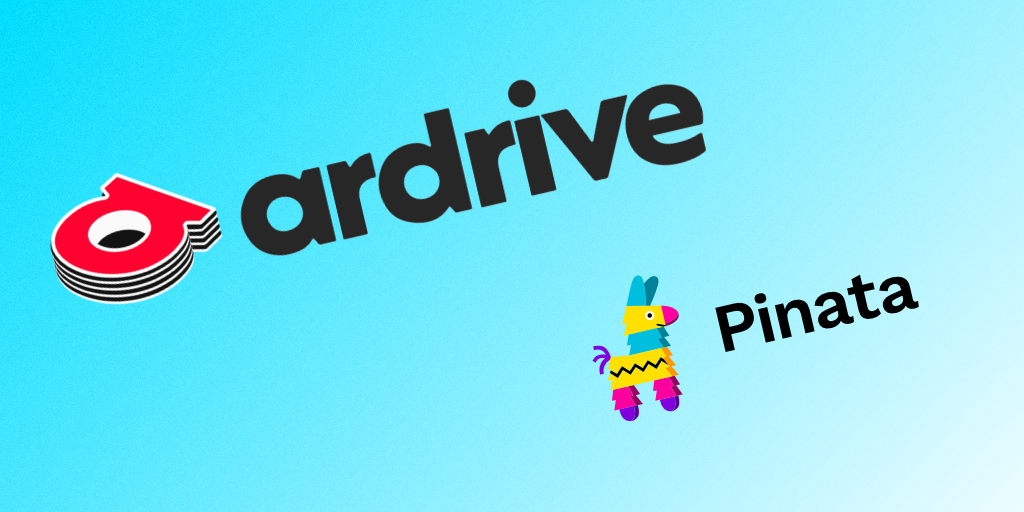
Move from IPFS and Piñata to Arweave – via ArDrive
Recently, IPFS pinning service, Piñata, announced they were updating their Terms and Conditions surrounding their pricing plan. This created a problem for many that were using IPFS to store their data and pinning it via Piñata. Now, ArDrive – the Arweave utilising project that offers data permanence solutions – has come up with a way for these users to migrate over to Arweave.
The process – which is achieved via the ArDrive CLI – should be especially beneficial to NFT creators that are currently using IPFS in combination with Piñata.
Let’s take a closer look!
Piñata updates service terms
During the recent NFT explosion, countless projects were created, as creators (or opportunists) saw a chance to get in on the latest Web3 hype. At the core of an NFT project are its assets (images, videos, music files, etc) and the metadata for those assets. And one of the most crucial decisions one can make, is where to store these assets.
One of the more popular solutions used was IPFS. But, due to the way IPFS works (and the necessity to “pin” data), it was commonly combined with IPFS pinning services, like Piñata Cloud, to prevent data loss. Piñata offered a free account with a generous amount of free storage for pinning data, so in turn many NFT creators took advantage of this.
But a few months ago, Piñata announced they were changing their service’s terms and pricing plans, which caused a headache for many already relying on it. Piñata still offers a free plan, but as mentioned in their blog, the free plan is:
Perfect for: Creators who are just starting their Web3 journey and want to experience what it’s like storing their content on IPFS through Piñata.
Moreover, the total amount of files that can be pinned on Piñata’s free plan is 100. This is not enough for larger NFT collections containing thousands of files. Especially considering each NFT has both a data file and a metadata file. So a project with 10k NFTs would have 20k files.
ArDrive’s Solution
As a result of the announcement, the ArDrive team decided to create a solution that fixes the issue. So they made an update for their Command Line Interface (CLI). The update allows NFT creators to import their IPFS assets to Arweave via ArDrive. Arweave offers permanent storage (no pinning needs) for a one time fee, and ArDrive makes the process as easy as using Dropbox.
Read more about IPFS vs Arweave in our article here.
Let’s take a closer look at ArDrive’s new update.
ArDrive CLI Update
By using the ArDrive CLI you can import IPFS assets to Arweave and tag them for searchability via GQL. Tagging your uploads with Content Identifiers (CIDs) is advantageous and practical. The uploads are self-sustaining and not reliant on pinning, providing users with a global, ever-lasting content address that they can use to access or share the data uploaded.
Again, it is important to stress that this is not a pinning service, as pinning means hosting the data and making it available on an additional node.
What ArDrive offers is data independence, or in other words, a backup for assets no longer pinned on IPFS gateways. This is extremely handy for those who created large NFT projects and hosted them on IPFS, but can no longer afford the hosting costs (approximately $20 a month).
IPFS tagging is essentially advanced metadata that you can attach to files uploaded via the ArDrive Command Line Interface (CLI). With advanced metadata, you can add extra tags to your uploads making them searchable in GQL and easier to find when searching on Arweave. That opens up the ability to create Atomic NFTs and provide unparalleled searching of data uploaded with these tags once they are on Arweave’s Permaweb.
How do I do this?
If you are not familiar with CLIs and NodeJS, the easiest approach here is to wait for ArDrive to release this feature to their Web App (coming in the future).
If you want to try it out now, some technical knowledge of using a CLI, and working with NodeJS is required.
The process is done via the ArDrive CLI, which now has a “–add-ipfs-tag” option to the upload-file command. The command will perform the tagging for you automatically.
If you already know the CID of your uploaded data, you can use the “IPFS-Add” tag with the IPFS CID using “ArDrive-CoreJS” or “ArDrive CLI”.
Tagging like this provides searching for Arweave transactions by their corresponding IPFS CID.
Read more in this thread by ArDrive, and to learn more go to the ArDrive website here.
TECH ????!
ArDrive-CoreJS v1.17.0 & ArDrive-CLI v1.19.0 have been released with the following features:
✅ Custom ArFS Metadata Tags
✅ Custom ArFS Metadata JSON
✅ Custom ArFS Data TagsThese features are currently only available for FILES in PUBLIC Drives.
Read on ????????
— ????????ArDrive.arweave.dev (@ardriveapp) August 4, 2022
If you need help using the ArDrive CLI, the best place to look for help is in the ArDrive Discord server.
Join our
